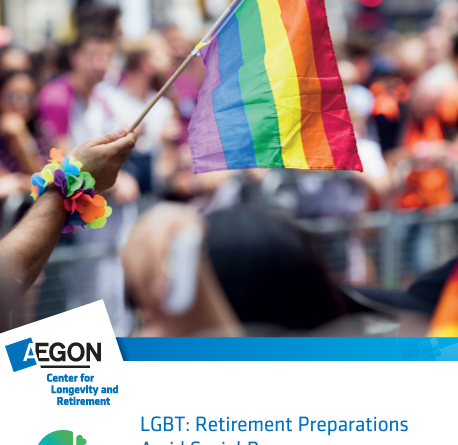LGBT Retirement Preparations Amid Social Progress
By Catherine Collinson, Executive Director, Aegon Center for Longevity and Retirement; CEO and President, Transamerica Institute and Transamerica Center for Retirement Studies
LGBT: Retirement Preparations Amid Social Progress is a collaboration between Aegon Center for Longevity and Retirement, and nonprofits Transamerica Center for Retirement Studies® (US), and Instituto de Longevidade Mongeral Aegon (Brazil). The report focuses on the retirement aspirations and plans among the LGBT community, and highlights findings from LGBT survey respondents from nine of the 15 surveyed countries comprising the 6th Annual Aegon Retirement Readiness Survey. Many of the traditional patterns of family and working life, including the way people plan and save for the long-term, have not applied in equal measure to the LGBT community. Until recently, LGBT people were legally denied same-sex relationship recognition, limiting their ability to get married and start families. In addition, discrimination in the workplace has restricted the career opportunities, equal pay, and employee benefits offered to LGBT people. These factors impact LGBT people throughout their working lives and in their retirement, for example, by being denied spousal rights on government and employer pension benefits. Our research finds both similarities and differences between how LGBT people and heterosexuals prepare for retirement. While LGBT people and heterosexuals share broadly similar expectations regarding their retirement ages, their preparations differ in subtle, yet important, ways. LGBT workers are more likely to have a written retirement plan, but they are less likely to be saving habitually. The main conclusion of this report is that LGBT people face an even greater risk of not achieving a financially secure retirement compared to heterosexuals. While LGBT people and heterosexuals share similar retirement aspirations, differences in family circumstances, challenges in the workplace and health issues lead to greater vulnerability among LGBT people. The report also concludes that individuals, employers, the financial services industry, and governments all have a role to play in supporting healthy aging and long-term financial security for all.
Read the complete book here











